Senate
Senate (Latin Senatus): supreme deliberative body in the Roman republic.
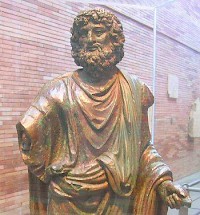
According to the official fiction that is expressed in the famous abbreviation S.P.Q.R., the Roman republic and empire were governed by Senate and People of Rome, Senatus PopulusQue Romanus. Of course, there were always magistrates and - later - emperors who could decide to ignore the Senate, but never for a long period. This deliberative body was influential because it was the only institution in ancient Rome that could legitimize power. Without the Senate's consent, no magistrate or emperor could give orders.
Early history
Its origins are obscure, but there is no need to disbelieve the ancient sources that say that the Senate was founded by one of Rome's legendary kings. It was said that Romulus had founded a Senate with a hundred members, who were called patres ("fathers"), and that their number was later increased. The reports about this legendary Senate are comparatively late, but ethnographic parallels make it extremely likely that a more or less formal council of family chiefs and other elderly men did exist and advised the king and selected a new ruler after his death. (Senatus is derived from senex, "old man".)
After the fall of king Tarquin the Proud in the late sixth century (in 510 according to the unreliable Varronian chronology), the Senate had to reorganize the state. According to later historians (e.g., Livy), the republic was founded by Brutus, but it is easy to see "through the legend" and discern that he was aiming at one-man rule. The republican system must have developed gradually, but in the end, the Romans chose to be ruled by two consuls, who served for one year.
Like the kings, the magistrates were advised by the Senate, but there was an important difference: during the monarchy, the Senate had been convoked at his majesty's request, and it had consisted of the family leaders he had invited, but now, the Senate also included former magistrates. The consuls could not ignore them when they convened the Senate. What had once been a council of elders had started to become a deliberative body of ex-magistrates.
Middle Republic
Still, there were other members of the Senate, who were not former consuls. In the fifth century, the magistrates had to belong to the patrician families, but we also find non-patricians among the senators. These men must have been wealthy plebeians and were probably invited by the consuls. The exact nature of their claim to membership is not entirely clear.
However, after the Laws of Gaius Licinius Stolo and Lucius Sextius Lateranus (367 VC) had opened the consulship to non-patricians, their presence in the Senate is no longer inexplicable. In a Lex Ovinia, rules were laid down for Senate membership, and it was made clear that former magistrates automatically became members, plus those people -patrician or plebeian- who were found worthy of membership by the censors. Membership was for life, although one had to fulfill several financial prerequisites. The censors also selected the princeps, the "first senator" with most experience and influence.
As the empire expanded over Italy, to Sicily, Hispania, and Greece, the number of magistrates increased. The new provinces were governed by praetors, of which there had been one in the 360s but six after the conquest of Hispania. Former aediles (after 123 BCE) and quaestors (after Sulla, below) were also included in the Senate. As a corollary, the number of former magistrates increased, and the Senate became a real body of experienced leaders. It became harder for magistrates to ignore senatorial advise and the recommendations of the Senate were now almost like laws.
Another result of the increasing number of former magistrates was a differentiating among the senators. The consulares (former consuls) were more important than ex-praetors, former aediles, and ex-quaestors. During a meeting of the Senate, the two consuls (who convened the Senate) spoke first, followed by other magistrates, the princeps, and those of consular rank. Only rarely did others speak.
Late Republic
It was not easy to become a senator. One needed a lot of money from respectable sources (agriculture, not commerce), had to be popular among the voters if one wanted to be elected, and needed connections. People from families that had already produced senators of consular rank had large advantages. Still, the Senate was officially never a closed body, and there were always new men who rose to the senatorial elite.
In the second century, the Roman elite slowly started to change. People of senatorial families preferred to marry their sons and daughters to the boys and girls of the best families in Rome, which were -of course- also senatorial families. As a result, an elite developed within the elite: the new elite of senatorial families, and the other, wealthy families, which still called themselves equites, "knights", an old name. For them, the taboo on commercial incomes was less rigid than it was for senators, and they often invested money in tax farming companies. As a result, tensions arose between an elite of magistrates and an elite of bankers.
This was not the only problem. Rome also had assemblies in which the people discussed important subjects (the comitia). Since the Lex Hortensia of 287, the decisions of the People's Assembly were binding - in other words, they were laws. The Senate, however, had similar rights, and the question was inevitable: what happens when the People's Assembly agrees with a proposal, and the Senate does not?
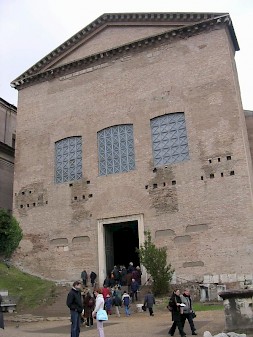
At first, this was not a big problem, because there were strong traditions and people usually knew which body made which kind of decisions. But in the mid-second century, tensions arose when Publius Cornelius Scipio Aemilianus was elected consul without permission of the Senate. In 133, the tribune Tiberius Sempronius Gracchus proposed land bills in the People's Assembly in order to prevent the Senate from intervening. This was against all traditions, and it meant the beginning of a century of civil war (described by Appian of Alexandria in his History of the Civil Wars).
In this century (133-31), there were two tactical approaches. Some politicians, the optimates, sought legitimacy in the Senate; others preferred to seek legitimacy in the People's Assembly and were called populares. To gain support of the people, the populares had to propose land bills and reform bills, which makes them look a bit like our progressive politicians; on the other hand, if you preferred the optimate tactic, you had to defend the traditional rights of the senatorial elite, which makes the optimates look like conservatives.
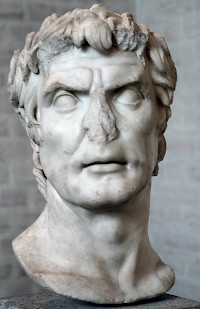
An important attempt to create consistency in Roman politics was the dictatorship of Lucius Cornelius Sulla (82-80), who simply solved the problems by giving all power to the Senate and abolishing the rights of the People's Assembly and its tribunes. At the same time, he tried to take away the tensions between the senatorial and equestrian elites by allowing knights to enter the Senate. From now on, there were 600 senators.
Sulla's system did not survive him. One of his best generals, Pompey the Great, had a spectacular career that quickly brought him from success to success, faster than was possible within the Sullan system. Together with Marcus Licinius Crassus, he revoked the laws of Sulla in 70, and received several new military commands from the People's Assembly. (Note how Pompey started as an optimate and became a popularis.)
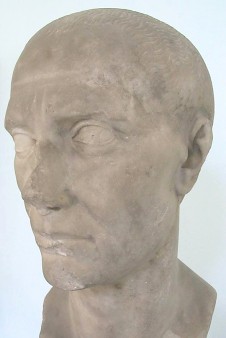
Military men like Pompey and Julius Caesar were becoming too powerful to fit within the system of joint rule of S.P.Q.R., Senate and People's Assembly of Rome. The Assembly gave the generals extraordinary commands and enormous powers, but once they had conquered new territories, the Senate refused to ratify their acts, because its members could not allow one man to become too powerful. Pompey and Caesar both tried to reform the constitution, but in vain. When the senators offended Caesar by refusing him the right to run for consul, the conqueror of Gaul declared war upon the Roman republic (7 January 49; text); Pompey decided to defend the rights of the Senate (turning optimate again), but was defeated by Caesar in the battle of Pharsalus (9 August 48).
This was the end of the Roman republic. From now on, it was clear that the Senate and People's Assembly could not jointly rule the empire. As the Senate had already shown that it was unable to govern the world even without popular opposition, and the empire was too large for a really democratic system, the only solution was one-man rule.
For almost four years, Caesar ruled the empire as if he were a king (dictator perpetuus, "forever dictator"), something that was unacceptable. Offices had always been obtained after the People's Assembly had voted, but Caesar appointed his officials. He needed legitimacy and tried to reconstruct the Senate, but in fact, it was nothing but a rubber-stamp body. To make matters worse, Caesar had pardoned many of his opponents, so that there were at one time (in the year 45) no less than 900 senators. Many of them had paid money to Caesar's war chest and were not really the honorable men who could legitimize Caesar's rule. As it turned out, a group of conservative senators, longing back to the days of the old republic had still existed, assassinated the new monarch on 15 March 44 (text).
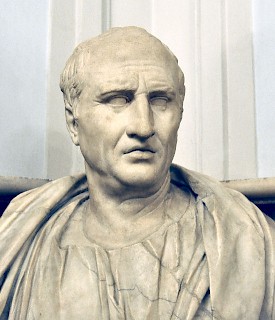
A new civil war broke out. Senators who had once opposed Caesar and had been pardoned, now hoped to restore the old republican institutions. Caesar's right-hand man Mark Antony was strong, but the leader of the senators, Marcus Tullius Cicero, was able to use Caesar's adopted son, Octavian, for the cause of the Senate. It give him an army to reinforce the army of the two consuls, and at Mutina in northern Italy, they defeated the army of Mark Antony (winter 44/43). For a moment, it seemed as if the Senate was firmly in charge of the republic again, but this was not the case. Both consuls had been killed in action, and Octavian now demanded the consulship. When the senators replied that he was too young, Caesar's heir marched on Rome and took what he demanded.
Now, Octavian surprised everyone by deciding to collaborate with Mark Antony. This remarkable volte-face had been engineered by Lepidus, a former officer in Caesar's army. He became the third member of the Second Triumvirate, which was recognized in November 43 by the People's Assembly (Lex Titia). The three men set out to reorganize and stabilize the Roman empire, and agreed that the Senate was the main source of troubles. Assassins took care of the last defenders of the Senate.
Empire
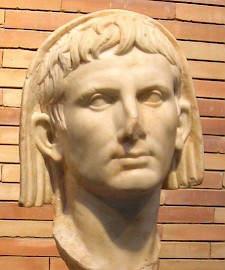
The triumvirs, Mark Antony, Lepidus, and Octavian, did not trust each other. When Octavian had destroyed the last stronghold of conservative senators, Sicily, Octavian immediately attacked Lepidus and stripped him of his powers (36). After this, Mark Antony, who was in charge of the east and had fallen in love with the Egyptian queen Cleopatra, was defeated by Octavian in 31 in the naval battle off Actium. From now on, Octavian was sole ruler; he called himself Augustus ("the exalted one").
Now, he had to find a way to reconstruct Roman society, which had been completely torn apart during the century of civil war. He was able to present himself not as a monarch, but as the man who had restored the republic. Augustus called himself princeps, as if he was nothing else than the "first senator", and combined the governorships of all provinces with armies and left the remainder to the senators. For them, the normal career (cursus honorum) still existed: they could become quaestors, aediles, praetors, consuls, and pretend to be the men in charge of the empire. Officially, they were still elected by the People's Assembly. In fact, the people elected only those who were supported by Augustus. Finally, it should be noted that Rome's first emperor had removed many unworthy men from the Senate, which gave the ancient institute a new aura of dignity.
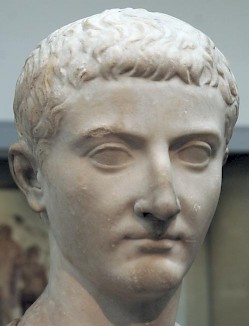
And the Senate had real powers. Offices and governorships were no longer appointments by dictators like Sulla, Caesar, or the triumvirs. The senators were responsible for several provinces, and took care of the state treasury (aerarium). When Augustus died in 14 CE, the Senate had to confirm the succession by Tiberius: it still was the political body that could legitimize power. The 600 members had a lot of experience and even though the real decisions were made by the emperor, the monarch knew he could not rule without the cooperation of the senators. Emperors like Nero and Domitian were finally overthrown because they had been unable to create a working relationship with the Senate.
Slowly, the Senate was changing its nature. Until Tiberius, all senators had been Italians. Claudius accepted senators from Gaul, and the Senate was increasingly recruited from former magistrates from all over the empire. At the same time, the emperors started to appoint senators again: rich and respectable knights could receive the rank of senator (adlectio), although they were never included inter consulares.
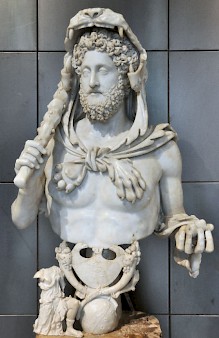
During the reign of Marcus Aurelius (161-180), new Germanic tribes threatened the frontier. The senatorial governors played no major role in the wars that followed; instead, military men and officials from the equestrian orders became increasingly important. In peace time, the system of Augustus, with its respect for the senators, had been perfect, but the times were changing and the reign of Marcus' son Commodus can be described as a war between the Senate and an emperor who sought support from the knights and lower classes.
The Senate never recovered from this clash. Commodus was assassinated in 192, but the new dynasty, founded by Septimius Severus, continued to prefer men of the equestrian order. In the third century, this policy was continued by other rulers.
Yet, the Senate remained the body that had to legitimize an emperor. Its social status was still immense, and now that its members were recruited from all provinces - including Africa and the Greek east - it really represented the ruling class of the entire empire, and not just Italy.
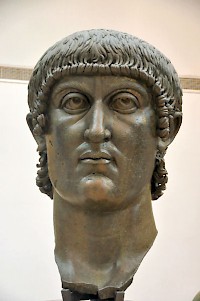
Yet, although the Senate had important representative tasks, its members played no role during the wars of the third century, and by the age of Diocletian (284-305) "senator" was nothing but an honorific title for wealthy landowners. Because the senators were not really enthusiastic when Constantine I the Great (306-337) converted to Christianity, this emperor created a second Senate in his new capital Constantinople. By 384, the two Senates contained 2,000 members each. By increasing the number of senators, Constantine had finally broken their power.
Senators were allowed to wear golden rings and white togas with a broad purple stripe. In the Circus Maximus (and later, the Colosseum), they had special seats on the front rows.